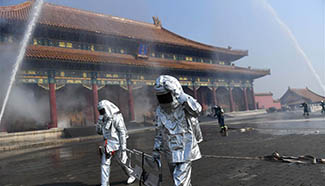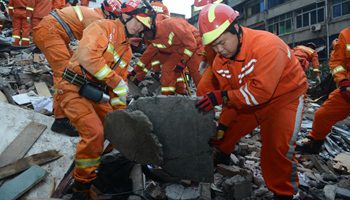BEIJING, Oct. 10 (Xinhua) -- China has issued guidelines on criminal procedure reform and the role of court trials in a bid to reduce wrongful convictions.
The guidelines issued by the supreme court and supreme procuratorate, along with the ministries of public security, state security and justice, seek to improve criminal procedure by enhancing the court's role in fact finding, identifying evidence, protecting rights and impartial judgment.
Reform of criminal procedure began when the Fourth Plenary Session of the 18th Central Committee of the Communist Party of China in October 2014 decided to fully advance the rule of law.
The guidelines were approved at a key meeting of the leading group for overall reform of the central authorities on June 27. The document was signed on July 20 by the Supreme People's Court and the Supreme People's Procuratorate, along with the ministries of public security, state security and justice.
The 21-clause document stresses the presumption of innocence; identifies several major problems in the current litigation system; puts forward a package of changes in the rules of evidence and investigation; and sets out the court's key role as protecting the rights of all interested parties.
Courts, procuratorates and the police should cooperate to ensure that innocent people are not wrongly convicted, it said.
In particular, the fifth clause stipulates that interrogations should be improved to prevent forced confessions. It also states that authorities must not oblige any person to incriminate themselves.
The guidelines stipulate that courts should acknowledge reasonable doubt in crime cases, and make decisions accordingly.
The reform reflects the requirements of modern criminal justice, and clarifies the direction of China's criminal procedure system, said Professor Bian Jianlin, head of the Procedural Law Research Institute of the China University of Political Science and Law.
Trial-centered reform of criminal procedures can optimize the allocation of posts and power in criminal justice, improve criminal procedures, transform the court's handling of criminal trials and improve legal defense, in bid to strengthen the system to prevent wrongful convictions, added Bian.
The reform came after a series of wrongful convictions in China undermined the credibility of the judicial system, which triggered social outrage.
One high-profile wrongful conviction -- and execution -- was of teenager Huugjilt in Inner Mongolia. Huugjilt was found guilty of rape and murder in 1996 and executed accordingly. He was finally declared innocent in December 2014, over a decade after he was wrongfully convicted.
The real killer was sentenced to death in early 2015.
In another case, a man from Sichuan Province in southwest China, Wang Benyu, was wrongfully sentenced to death with reprieve, for rape and murder, by the Higher People's Court in Inner Mongolia in 1994. He was not released until 2013, a year after the actual criminal was caught.
Trial-centered reform of criminal procedures will strengthen lawyers' functions as the guidelines stress lawyers' rights in cross-examinations in court investigations and their right in debate during court trials, said an anonymous source with China's judicial authorities.
Experts believe that the trial-centered reform will change the practice of the current investigation-centered criminal procedures which mean court trials are heavily reliant on files and records.
The old practice is prone to wrongful convictions, whereas in court trials it is more difficult to make incorrect decisions compared to investigation-based trails, said Li Fenfei, a professor with the Renmin University of China.
"The guidelines target precisely the crux of the problem," added Li.











